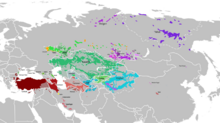
A | B | C | D | E | F | G | H | CH | I | J | K | L | M | N | O | P | Q | R | S | T | U | V | W | X | Y | Z | 0 | 1 | 2 | 3 | 4 | 5 | 6 | 7 | 8 | 9
The Turkic peoples are a collection of diverse ethnic groups of West, Central, East, and North Asia as well as parts of Europe, who speak Turkic languages.[37][38]
According to historians and linguists, the Proto-Turkic language originated in Central-East Asia,[39] potentially in Altai-Sayan region, Mongolia or Tuva.[40][41][42] Initially, Proto-Turkic speakers were potentially both hunter-gatherers and farmers; they later became nomadic pastoralists.[43] Early and medieval Turkic groups exhibited a wide range of both East Asian and West-Eurasian physical appearances and genetic origins, in part through long-term contact with neighboring peoples such as Iranic, Mongolic, Tocharian, Uralic and Yeniseian peoples, and others.[44][45][46]
Many vastly differing ethnic groups have throughout history become part of the Turkic peoples through language shift, acculturation, conquest, intermixing, adoption, and religious conversion.[1] Nevertheless, Turkic peoples share, to varying degrees, non-linguistic characteristics like cultural traits, ancestry from a common gene pool, and historical experiences.[1] Some of the most notable modern Turkic ethnic groups include the Altai people, Azerbaijanis, Chuvash people, Gagauz people, Kazakhs, Kyrgyz people, Turkmens, Turkish people, Tuvans, Uyghurs, Uzbeks, and Yakuts.
Etymology


The first known mention of the term Turk (Old Turkic: 𐱅𐰇𐰼𐰰 Türük or 𐱅𐰇𐰼𐰰:𐰜𐰇𐰛 Kök Türük, Chinese: 突厥, Pinyin: Tūjué < Middle Chinese *tɦut-kyat < *dwət-kuɑt, Old Tibetan: drugu)[47][48][49][50] applied to only one Turkic group, namely, the Göktürks,[51] who were also mentioned, as türüg ~ török, in the 6th-century Khüis Tolgoi inscription, most likely not later than 587 AD.[52][53][54] A letter by Ishbara Qaghan to Emperor Wen of Sui in 585 described him as "the Great Turk Khan".[55][56] The Bugut (584 CE) and Orkhon inscriptions (735 CE) use the terms Türküt, Türk and Türük.[57]
During the first century CE, Pomponius Mela refers to the Turcae in the forests north of the Sea of Azov, and Pliny the Elder lists the Tyrcae among the people of the same area.[58][59][60] However, English archaeologist Ellis Minns contended that Tyrcae Τῦρκαι is "a false correction" for Iyrcae Ἱύρκαι, a people who dwelt beyond the Thyssagetae, according to Herodotus (Histories, iv. 22), and were likely Ugric ancestors of Magyars.[61] There are references to certain groups in antiquity whose names might have been foreign transcriptions of Tür(ü)k, such as Togarma, Turukha/Turuška, Turukku and so on; but the information gap is so substantial that any connection of these ancient people to the modern Turks is not possible.[62][63]
The Chinese Book of Zhou (7th century) presents an etymology of the name Turk as derived from 'helmet', explaining that this name comes from the shape of a mountain where they worked in the Altai Mountains.[64] Hungarian scholar András Róna-Tas (1991) pointed to a Khotanese-Saka word, tturakä 'lid', semantically stretchable to 'helmet', as a possible source for this folk etymology, yet Golden thinks this connection requires more data.[65]
It is generally accepted that the name Türk is ultimately derived from the Old-Turkic migration-term[66] 𐱅𐰇𐰼𐰰 Türük/Törük,<[67] which means 'created, born'[68] or 'strong'.[69] Turkologist Peter B. Golden agrees that the term Turk has roots in Old Turkic,[70] yet is not convinced by attempts to link Dili, Dingling, Chile, Tele, and Tiele, which possibly transcribed *tegrek (probably meaning 'cart'), to Tujue, which transliterated to Türküt.[71]
Scholars, including Toru Haneda, Onogawa Hidemi, and Geng Shimin believed that Di, Dili, Dingling, Chile and Tujue all came from the Turkic word Türk, which means 'powerful' and 'strength', and its plural form is Türküt.[72] Even though Gerhard Doerfer supports the proposal that türk means 'strong' in general, Gerard Clauson points out that "the word türk is never used in the generalized sense of 'strong'" and that türk was originally a noun and meant "'the culminating point of maturity' (of a fruit, human being, etc.), but more often used as an meaning (of a fruit) 'just fully ripe'; (of a human being) 'in the prime of life, young, and vigorous'".[73] Hakan Aydemir (2022) also contends that Türk originally did not mean "strong, powerful" but "gathered; united, allied, confederated" and was derived from Pre-Proto-Turkic verb *türü "heap up, collect, gather, assemble".[74]
The earliest Turkic-speaking peoples identifiable in Chinese sources are the Yenisei Kyrgyz and Xinli, located in South Siberia.[75][76][note 2] Another example of an early Turkic population would be the Dingling.[81][82][83]
In Late Antiquity itself, as well as in and the Middle Ages, the name "Scythians" was used in Greco-Roman and Byzantine literature for various groups of nomadic "barbarians" living on the Pontic-Caspian Steppe who were not related to the actual Scythians.[84][85] Medieval European chroniclers subsumed various Turkic peoples of the Eurasian steppe as "Scythians". Between 400 CE and the 16th century, Byzantine sources use the name Σκύθαι (Skuthai) in reference to twelve different Turkic peoples.[86]
In the modern Turkish language as used in the Republic of Turkey, a distinction is made between "Turks" and the "Turkic peoples" in loosely speaking: the term Türk corresponds specifically to the "Turkish-speaking" people (in this context, "Turkish-speaking" is considered the same as "Turkic-speaking"), while the term Türki refers generally to the people of modern "Turkic Republics" (Türki Cumhuriyetler or Türk Cumhuriyetleri). However, the proper usage of the term is based on the linguistic classification in order to avoid any political sense. In short, the term Türki can be used for Türk or vice versa.[87]

